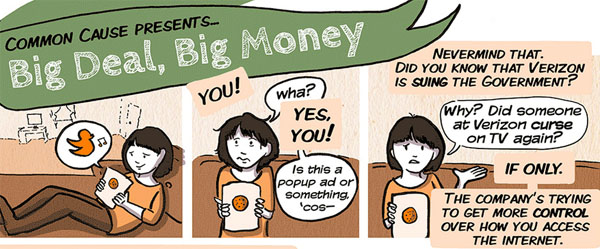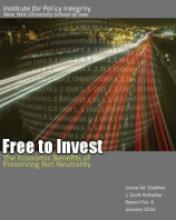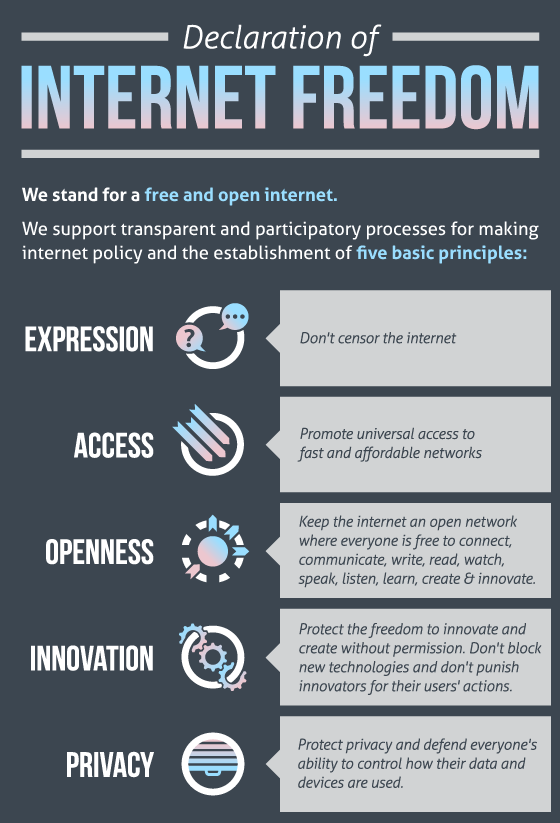
Fast, affordable Internet access for all.

Entrepreneur: I plan to launch a better streaming music service.

We have reported on network neutrality many times in the past. This has been a policy debate on whether Internet service providers should be able to prioritize some content at the expense of others - should Comcast be able to charge me more to visit Fox News than it does to reach MSNBC? Should it be able to make YouTube videos very slow to load and unreliable unless I pay a special fee to access that site? This is the question of network neutrality.
Common Cause just released a "comic book" that takes a look at the concept, the political influences, and the consequences we may face if we lose network neutrality. "Big Deal, Big Money" also provides some options for action.
A short snippet:
Read Big Deal, Big Money here.
In December, 2010, Verizon Wireless began operating its network via C-Block spectrum with licenses it acquired in the 2008 auction. In keeping with net neutrality rules unique to C-Block usage, Verizon agreed long ago that it would not block or limit consumers' ability to tether on their 4G LTE network.
Tethering allows a consumer to use a device, such as a smartphone, as a modem to funnel Internet access to an additional device. On July 31, the FCC agreed to end an investigation into whether or not Verizon Wireless had violated this rule. In exchange, Verizon Wireless would make a $1.25 million "voluntary contribution." Verizon Wireless did not admit it broke the rules. The FCC's consent decree requires the practice cease and that Verizon Wireless implement policies to curtail the behavior.
The story began in 2011. Verizon Wireless began charging its customers an addition $20 per month to allow them to tether additional devices to their smartphones and called the feature "Mobile Broadband Connect."
The Free Press filed a complaint. The FCC began their investigation in October, 2011. From the Free Press website:
Free Press argued that by preventing customers from downloading these applications that allow customers to use their phones as mobile hotspots, Verizon violated conditions of its 700 MHz C Block licenses, the spectrum in which Verizon operates its LTE service. When Verizon purchased the licenses, it agreed to abide by conditions that it not “deny, limit or restrict” its customers’ ability to use the applications or devices of their choosing.
The company also asked the Google Play Store store to block Verizon Wireless customers from accessing software that would enable tethering. Google complied with the request, even though it has often advocated for net neutrality, but were not investigated because they are not an ISP.

In 2010, the Institute for Policy Integrity at the New York University School of Law released a report titled Free to Invest: The Economic Benefits of Preserving Net Neutrality. The report, authored by Inimai Chettiar and J. Scott Holladay, is a great resource - substantial and very digestible - on what net neutrality really is, how it is (or is not) regulated, and the economic possibilities policy makers must consider when moving ahead.
The Institute looks at the economic relationships between content providers, ISPs, and consumers. In addition to the current economic structure, the report examines possible alternate pricing models that are contrary to our current net neutrality policies. We have extracted just a few excerpts and encourage you to get the full report.
There are five main findings that are examined in depth:
Internet Market Failure: The report explains how ISPs lose potential dollars under today's market structure. There is ample motivation for them to find a way to charge content providers based on delivery, and open up a whole new market far beyond our net neutrality policy.
The FCC’s nondiscrimination rule would prohibit an ISP from treating any content, application, or service in a “discriminatory” manner, subject to reasonable network management. This clearly bans pure price discrimination (charging different content providers different prices to access their subscribers). The regulation also bans ISPs from offering content providers a “take it or leave it” offer on access to their users. For example, an ISP like Verizon could not charge a website of a company like The New York Times a certain price for access to its subscribers by threatening to block the website from its network and therefore from its Internet subscribers.
Smart Policy Can Help: The authors of the report stress how the Internet must be viewed as a two pronged market - infrastructure to deliver the content and the content itself - and how both are equally important. Effective policy must recognize the delicacy of that balance.
Preamble: We believe that a free and open Internet can bring about a better world. To keep the Internet free and open, we call on communities, industries and countries to recognize these principles. We believe that they will help to bring about more creativity, more innovation and more open societies. We are joining an international movement to defend our freedoms because we believe that they are worth fighting for. Let’s discuss these principles — agree or disagree with them, debate them, translate them, make them your own and broaden the discussion with your community — as only the Internet can make possible. Join us in keeping the Internet free and open.
 This is the beginning of a movement, that will be shaped by those who choose to participate. Join the conversation! Some of the sites discussing the Declaration of Internet Freedom include Reddit, TechDirt, The Verge, Center for Democracy and Technology, and Cheezburger.
Josh Levy discusses the backstory of this Declaration on HuffPo while Sascha Meinrath and Craig Aaron discuss the need for the Declaration at Slate.com.
We strongly encourage organizations, businesses, and individuals to sign on.
This is the beginning of a movement, that will be shaped by those who choose to participate. Join the conversation! Some of the sites discussing the Declaration of Internet Freedom include Reddit, TechDirt, The Verge, Center for Democracy and Technology, and Cheezburger.
Josh Levy discusses the backstory of this Declaration on HuffPo while Sascha Meinrath and Craig Aaron discuss the need for the Declaration at Slate.com.
We strongly encourage organizations, businesses, and individuals to sign on.Politicians aren’t always especially thoughtful about, or even familiar with, information technology. George W. Bush used the term “Internets” during not one but two presidential debates. The late Alaska Senator Ted Stevens famously referred to the World Wide Web as a “series of tubes.” And John McCain drew ridicule in 2008 when he conceded that he was still “learning to get online myself.” Much worse than these gaffes, however, are some of the policies that have been promoted by lawmakers and candidates who seem to fundamentally misunderstand the importance of a free and open Internet. In recent years, we have seen politicians accede to the interests of giant telecom companies rather than support net neutrality; propose anti-piracy bills that threaten Internet freedom; and, as Siddhartha Mahanta recently documented at TNR Online, block poor communities from receiving broadband access.Good to see this issue being discussed outside of the standard tech circles. Especially when outlets like the New Republic explicitly call for more wireless subscriber protections:
There are, of course, ways in which the administration has disappointed. Even when the White House has done the right thing on Internet issues, it has not always acted as speedily or as forcefully as it might have. Moreover, it has not always done the right thing. Particularly striking was the Federal Communications Commission’s (FCC) decision, in late 2010, to exempt mobile carriers from new rules protecting net neutrality.